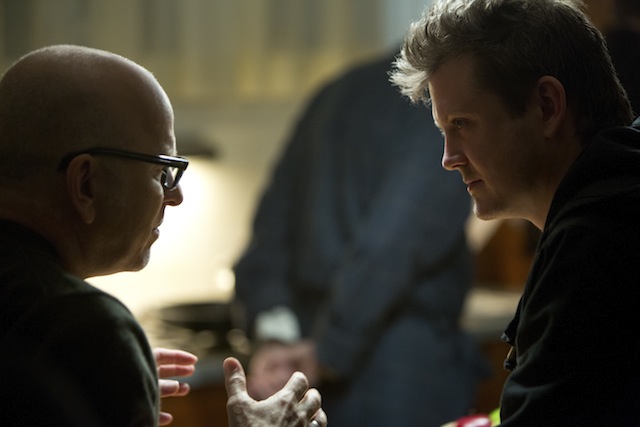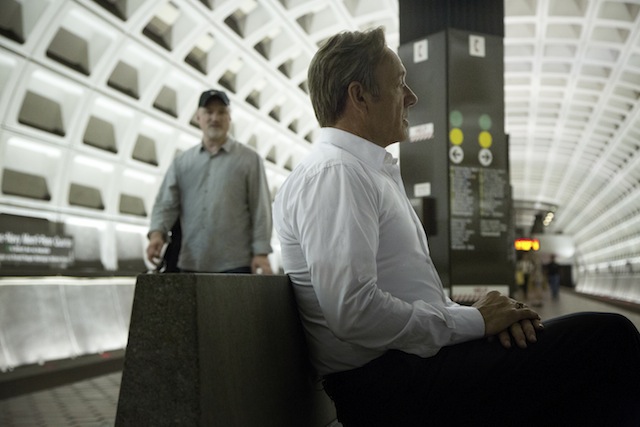House of Cards: The “13-hour movie” defining the Netflix experience
Beau Willimon talked to Ars about how the streaming company is changing TV's rules.
Every late January/early February TV calendar is loaded with premier dates. At first glance 2013 is no different—the network and cable heavyweights are obliging. (Editor’s note: Skip that Kevin Bacon show on Fox, though episode one of FX’s The Americans was fun.) But with this year’s slew of pilots, the most anticipated debut comes from an unexpected source: Netflix. Back in 2011, the reigning champs of streaming video turned heads by outbidding outlets like Showtime and HBO for an original series called House of Cards. It’s not the first bit of never-before-seen content Netflix has been involved with; it’s not even the service’s lone media project scheduled for 2013. But House of Cards—starring Kevin Spacey and directed by David Fincher—is certainly the most high-profile Netflix-backed endeavor, with the most riding on its February 1 release. CEO Reed Hastings has already asked investors for more money, which would partially go toward original programming. Chief content officer Ted Sarandos says the minimum goal is five programs per year. And headlines this week loudly declare this undertaking as “the next chapter of TV/Internet content” and anoint Netflix “the next HBO.”
Ask some of the players involved, however, and they’ll say arguing that TV is evolving is a waste of time. “Any distinction between the Internet and TV will fall away in the next five or six years, so I wouldn’t really talk about this as a new format so much as the distinction between formats is going away,” says Beau Willimon, the showrunner behind House of Cards.
“This will lend itself to interesting possibilities. We went an hour because in some territories, things will be on regular broadcast TV where the Netflix service isn’t available. But when streaming is available anywhere across the globe, there’s not even a reason to stick the half hour or hour-long models. You can have an episode that’s 20 minutes, an episode that’s 90 minutes. And I think audiences have already gotten used to—with DVR and Netflix—having a great bit of control over their viewing habits. If people want to reach audiences who are used to that, they’re going to have to adapt. Netflix just happens to be the first, so they’re leading the charge.”
If Willimon sounds a bit off-script for a TV talking head, it’s because he is. His background is well documented, famously going from political staffer to Farragut North, then from playwright to an Oscar nomination with Ides of March. He’s never worked in TV before; neither has David Fincher, and Kevin Spacey only has marginal experience. But Willimon thinks that’s partially why House of Cards will match its hype. “We weren’t bound by convention, we didn’t have ingrained habits as to how to make TV and so we just approached it as storytellers: ‘What’s the story we want to tell and what’s the best way to tell it?’ We didn’t always reinvent the wheel, but we always questioned it.“

Director Allen Coulter (left) talks with Beau Willimon on the set of House of Cards.
“You saw Ides of March and you know David Fincher’s work. We do not tend to shy away from the risqué with this show,” Willimon says. “We wanted to tell a dark story: bad people doing bad things. Maybe on another network we would’ve gotten pushback on a number of things we do, but I think we take it much further than the BBC series did. I don’t want to give too much away, but if you’re worried about us avoiding the risqué or the potentially controversial, you should put those worries to bed right away. Even the first 30 seconds I don’t think would’ve made it past a lot of network execs.”
(A preview on Grantland will spoil this scene for you. The top of this TechCrunch article is the best description we’ve seen of said 30 seconds without giving away what’s actually happening. But Ars has seen the first two episodes and it appears Willimon is right—we haven’t seen that on TV before. You can check it out for yourself beginning February 1.)
Beyond what’s on screen, there are significant new TV business practices looming with House of Cards, first and foremost being Netflix’s hands-off approach. Netflix isn't producing the show; it's simply operating as the company licensed exclusively for its service. So Willimon and the creative team had “virtual complete control and freedom.” Unlike nearly all new scripted television, they weren’t even getting formal notes from their ‘network’ in this instance.
“At the very beginning they said and promised, ‘We believe in you and want you to make the show you want to make. Because whatever show you want to make is the one we want to air. You know better than us,’” Willimon says. “That takes an incredible amount of boldness but also business savvy to take that step. It emboldens you to take risks and try things maybe other creative teams would stop themselves before, saying, ‘Oh, it’ll never make it past network.’ You never felt like you had a network breathing down your neck and I think that’s conducive to creativity.”
Part of that initial deal includes another unparalleled opportunity. Rather than the House of Cards team producing a few episodes, waiting for them to air, then worrying about cancellation, it has an unprecedented commitment from Netflix. Twenty-six episodes upfront. There's no ratings watching to be done here, possibly ever, really (as Vulture notes, Netflix doesn't depend on ad sales so we may never know how the House of Cards viewership compares to traditional TV). And to really emphasize the true Netflix nature of all this, discussions occurred throughout its creation about how the show will be released. No need for cliff hanger endings and “next week on” montages—ultimately House of Cards’ 13-episode first season will be available all at once.
“We looked at all sorts of different models, but decided that was the best way to go,” Willimon says. “That’s what the Netflix experience is—putting the choice in the audience’s hands: how they want to watch it, when they want to watch it, and in what chunks they want to watch it. That was the best way to exploit what they have to offer that no one else does, which is your personalized viewing experience.”

Director David Fincher works with Kevin Spacey during filming for House of Cards.
“On a lot of other shows, you have to play the ratings game. Even great shows in the first half of their first seasons may implement these artificial cliffhangers to keep people coming back because they’re fighting for their survival,” Willimon says. “We didn’t have to worry about that. So we could think about, not just one season but two seasons. I could implement something in early season one and it might not come back until the end of season two. That means more layered, more sophisticated storytelling. Our hope was people would want to immediately watch the next episode, not because we instituted some sort of superficial cliffhanger, but because they’re so invested in the complex story and characters, that’s what draws them back.”
Ultimately, fan and critical reception to House of Cards will carry a lot of weight for Netflix’s original programming dreams going forward. However, just the fact that the company reached this point may already establish it as a real player in content creation. After all, approaching Hollywood types with more creative freedom, more guaranteed episodes, and more room to experiment is a lucrative opportunity. Netflix has leveraged that opportunity already post-House of Cards, landing Arrested Development, a comedy from the creator of Weeds, and a horror series from the director of Hostel. So even before he can experience any of the critical reception, Willimon thinks this trend will continue.
“It may become more and more the model,” Willimon says. “I think as great filmmakers and people in the TV world say, ‘If I have a choice between Net A and Net B and one will allow me to make the show I want to make while the other is meddlesome,’ where are you naturally going to gravitate? It’s savvy, look at the amount of talent Netflix has attracted just in its first foray into this. And I’m not talking just about our show—whether it’s Arrested Development, Hemlock Grove, or Orange is the New Black. They’ve got real heavyweights among the best in the business and I think you’re going to see the gravitation toward this model continue.“
Listing image by Melinda Sue Gordon for Netflix.



No comments:
Post a Comment